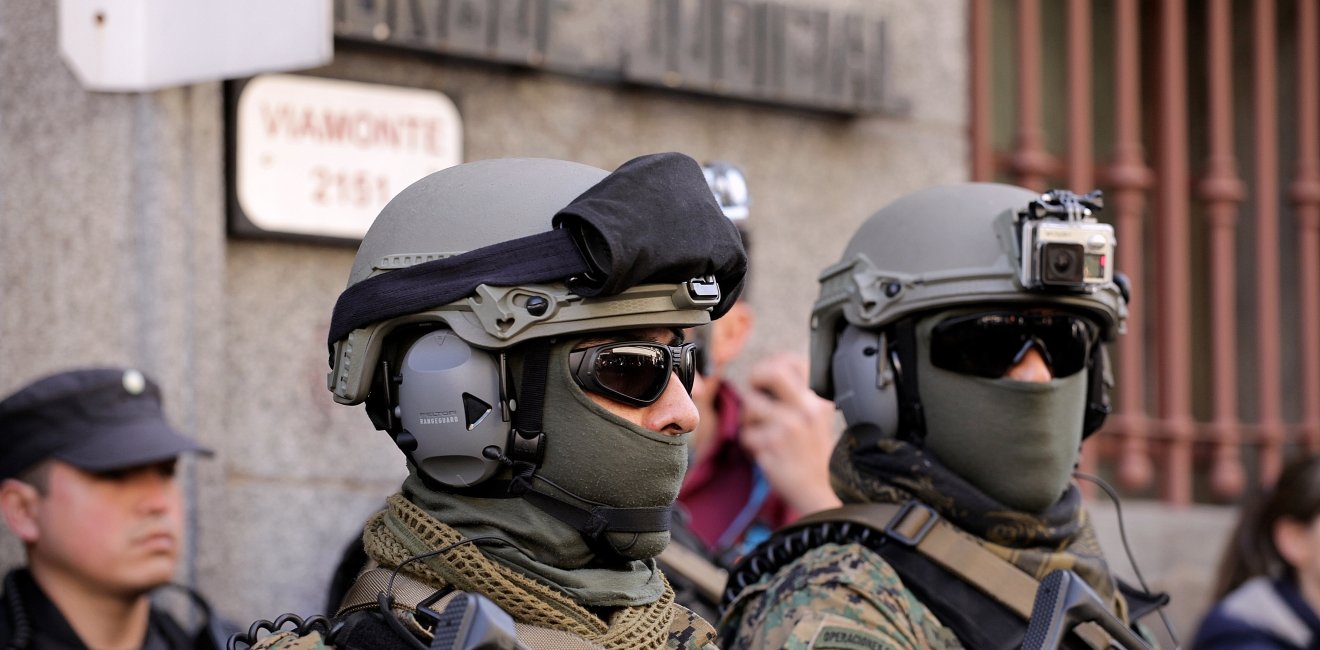
A blog of the Latin America Program
Defending Argentina
By Lucy Hale
President Alberto Fernández has signed an executive order that overhauls Argentina’s national defense strategy and restricts the military’s focus to external threats. It was a major reversal from his predecessor, President Mauricio Macri, who increased the role of the armed forces in internal security. It also appeared to undermine Mr. Macri’s efforts to closely align Argentina’s security policies with the United States and could limit Argentina’s participation in hemispheric defense initiatives.
But the new approach isn’t new for Argentina, which has often kept its military at arm’s length since the return to democracy. Keeping the armed forces out of internal affairs was prioritized in defense legislation passed under President Raúl Alfonsín (1983-1989). Though the armed forces are a relatively well-respected institution, both parties have starved the military of resources; military expenditure has not exceeded 1 percent of GDP in decades. As a result, its capabilities have degraded, as was clear in the tragic loss of the San Juan submarine under the last administration.
Narrow Lane
Under Presidents Néstor Kirchner (2003-2007) and Cristina Fernández de Kirchner (2007-2015), both critics of the military establishment, Argentina expanded civilian control and oversight over its armed forces. In reorienting Argentina’s military, the Kirchners invoked the memory of the “Dirty War” (1976-1983), when a military dictatorship brutally repressed the population and murdered as many as 30,000 civilians.
In a symbolic act, Mr. Kirchner removed portraits of Jorge Rafael Videla and Reynaldo Bignone, leaders of Argentina’s last dictatorship, from the Museo Sitio de Memoria ESMA. However, the Kirchners did not limit themselves to symbolic gestures to corral the military. Over their twelve years in power, they issued numerous decrees that curtailed the military’s involvement in internal security and surveillance. Mr. Kirchner set the precedent that the military’s responsibility was countering “aggression of foreign origin,” narrowly defined as “the use of force by a state’s armed forces” against Argentina.
For her part, Ms. Fernández de Kirchner focused on expanding civilian oversight over the armed forces. She also sought to reshape Argentina’s approach to international cooperation, rejecting the approach of President Carlos Menem (1989-1999). Mr. Menem’s close ties to the United States led him to send troops to the first Gulf War and earned Argentina the resumption of U.S. arms sales under President George H.W. Bush and major non-NATO ally status under President Bill Clinton. Ms. Fernández de Kircher favored a regional defense agenda coordinated by the now defunct UNASUR organization. She eschewed the “anachronistic” U.S.-backed Organization of American States’s Inter-American Defense Board.
New Mission
Following Mr. Macri’s 2015 election, Argentina once again sought security cooperation with the United States. Mr. Macri signed an agreement with the United States for cybersecurity collaboration, and authorized regular joint military exercises. Argentina expanded counterterrorism activities at the urging of U.S. authorities, including its decision to designate Hezbollah as a terrorist organization and publish a registry of individuals and entities linked to terrorist networks. In 2018, U.S. Defense Secretary James Mattis visited Argentina, the first visit by a secretary of defense since 2005, and signed an agreement to strengthen military cooperation.
Mr. Macri also signed decrees that expanded the role of the armed forces. His reforms permitted the military to conduct domestic surveillance, for example, and increased the military’s role in policing border areas. Mr. Macri’s reforms also assigned the armed forces responsibility for confronting nonstate actors, and recommitted Argentina to OAS-led defense initiatives.
Two Steps Back
Mr. Fernández wasted little time in terminating Mr. Macri’s experiment. He has resisted pressure from his own coalition to revoke the designation of Hezbollah as a terrorist organization, but he moved quickly to reimpose Mr. Kirchner’s limits on domestic military activity. In an interview with the Wilson Center, Security Minister Sabina Frederic said the administration recognized a “strict division between defense and security,” though soldiers have been instrumental in assisting in COVID-19 response, including by distributing food aid.
The Fernández administration has also made clear it shares Ms. Fernández de Kirchner’s skepticism of the Pentagon. The new defense minister, Augustín Rossi, said he had ended Argentina’s “automatic alignment” with the United States on defense issues. Further complicating ties with Washington, the new government has shown no discomfort with a controversial space complex operated by the Chinese military in Patagonia – an installation Foreign Minister Felipe Solá defended in an interview with the Wilson Center. Beijing established the facility during the Fernández de Kirchner presidency, provoking forceful criticism from the United States.
Argentina was once among Latin America’s most active contributors to United Nations peacekeeping operations. Yet Argentina has been reducing its peacekeeping footprint for years, most dramatically in withdrawing its troops from Haiti in 2015. Argentina maintains deployments in six out of 13 UN peacekeeping operations, but its support is modest. It is not clear how Argentina’s new government will respond to likely requests from the United States, the largest contributor to peacekeeping operations, to resume Argentina’s previous pace of peacekeeping.
As with much of the new government’s agenda, its defense strategy is not entirely clear. But the speed of its reforms suggests significant shifts that could complicate U.S. hemispheric defense goals and impose new burdens on Argentina’s civilian defense institutions to counter terrorism and narcotics trafficking.
Author


Latin America Program
The Wilson Center’s prestigious Latin America Program provides non-partisan expertise to a broad community of decision makers in the United States and Latin America on critical policy issues facing the Hemisphere. The Program provides insightful and actionable research for policymakers, private sector leaders, journalists, and public intellectuals in the United States and Latin America. To bridge the gap between scholarship and policy action, it fosters new inquiry, sponsors high-level public and private meetings among multiple stakeholders, and explores policy options to improve outcomes for citizens throughout the Americas. Drawing on the Wilson Center’s strength as the nation’s key non-partisan policy forum, the Program serves as a trusted source of analysis and a vital point of contact between the worlds of scholarship and action. Read more


Argentina Project
The Argentina Project is the premier institution for policy-relevant research on politics and economics in Argentina. Read more


Brazil Institute
The Brazil Institute—the only country-specific policy institution focused on Brazil in Washington—aims to deepen understanding of Brazil’s complex landscape and strengthen relations between Brazilian and US institutions across all sectors. Read more

Explore More in Weekly Asado
Browse Weekly Asado
Dengue Haunts South America’s Summers

Lessons from Costa Rica’s Economic Transformation

Women and Latin America’s Digital Revolution

